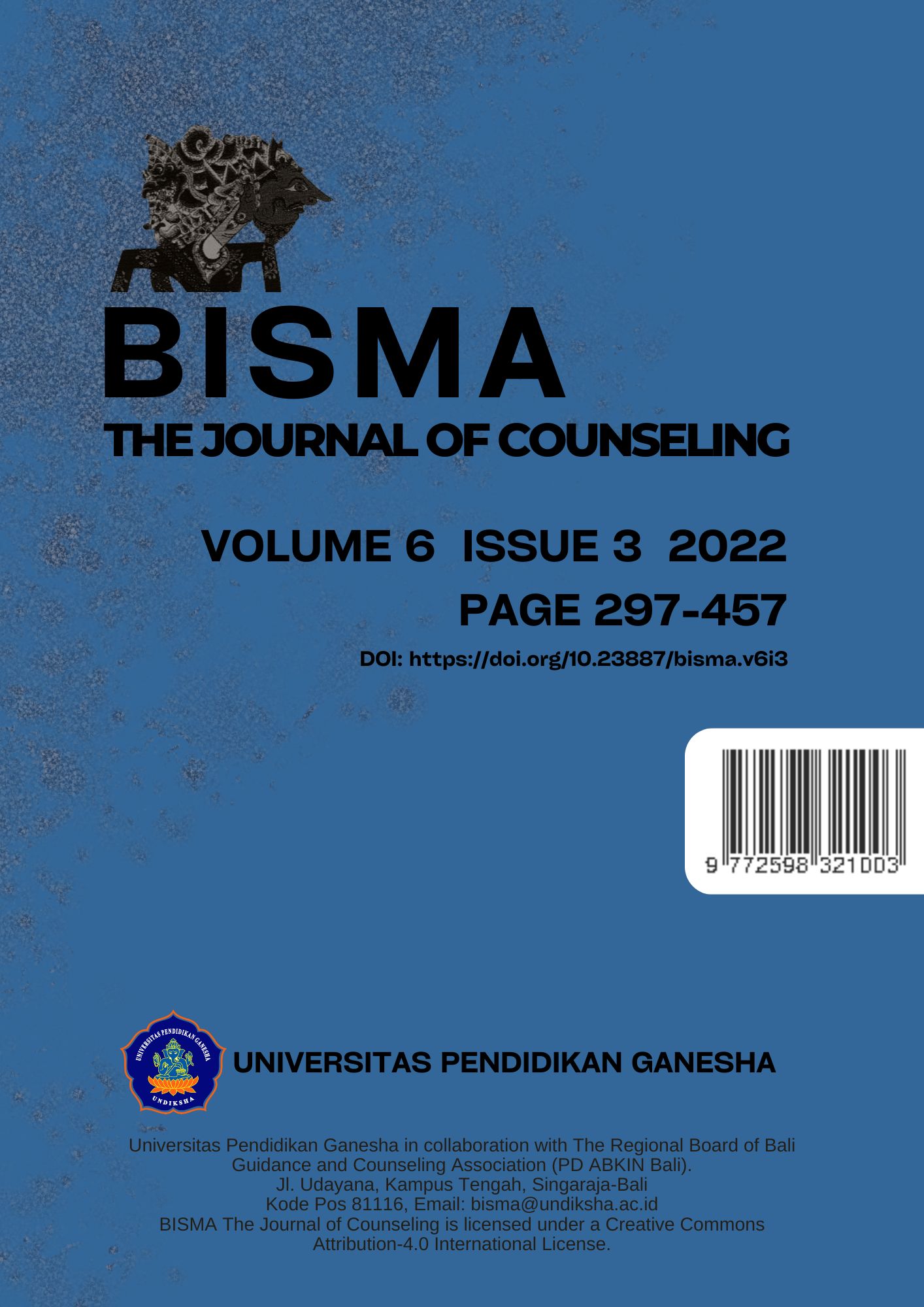Determinants of Academic Stress in Students
DOI:
https://doi.org/10.23887/bisma.v6i3.53548Keywords:
Academic Stress, Students, Literature ReviewAbstract
Students can experience academic stress at different levels, if the academic stress experienced by students increases, it will affect the productive quality of students in carrying out lectures both online and face-to-face, therefore it is necessary to study in depth related to the determining factors of student academic stress to help students deal with the challenges faced during lectures. The strategy used in this study is a type of systematic literature review research using qualitative methods. The approach used in this study is a meta-ethnograph, based on the results of research that students can experience academic stress both online and offline lectures, as for the determining factor of student academic stress, which is not only a factor from within the individual (internal), but can also be influenced by external factors (external). Internal factors are self-efficacy, hardiness, mindset, peer competition, character, changes in life atmosphere, difficulty managing life, low achievement motivation, low self-regulated learning, dependence on gadgets, self-adjustment and physical factors. External factors are low social support, financial problems, less supportive signals when studying online, the cost of spending internet credit increases. For future research, we can present a guidebook related to self-help to help students overcome academic stress.
References
Agustiningsih, N. (2019). Gambaran Stress Akademik dan Strategi Koping Pada Mahasiswa Keperawatan. Jurnal Ners Dan Kebidanan (Journal of Ners and Midwifery), 6(2), 241–250. https://doi.org/10.26699/jnk.v6i2.art.p241-250
Andiarna, F., & Kusumawati, E. (2020). Pengaruh Pembelajaran Daring terhadap Stres Akademik Mahasiswa Selama Pandemi Covid-19. Jurnal Psikologi, 16(2), 139. https://doi.org/10.24014/jp.v16i2.10395
Defitri, A. A. R. M. Z. (2021). Hubungan Dukungan Sosial Teman Sebaya Dengan Stres Akademik Pembelajaran Daring Pada Masa Pandemi Covid-19. Health Care : Jurnal Kesehatan, 10(2), 287–296.
Hargiana, G., Sintiawati, T., Hargiana, G., Sintiawati, T., Keperawatan, D., Fakultas, J., Keperawatan, I., Indonesia, U., Studi, P., Fakultas, S., Keperawatan, I., Indonesia, U., & Kesehatan, J. (2020). Hubungan Ketergantungan Gawai Dengan Stres Akademik Pada Mahasiswa Keperawatan. 9(1).
Kirana, A., & Juliartiko, W. (2021). Self-regulated learning dan stres akademik saat pembelajaran daring di masa pandemi covid-19. Jurnal Psikologi, 14(1), 52–61.
Lubis, H., Ramadhani, A., & Rasyid, M. (2021). Stres Akademik Mahasiswa dalam Melaksanakan Kuliah Daring Selama Masa Pandemi Covid 19. Psikostudia : Jurnal Psikologi, 10(1), 31. https://doi.org/10.30872/psikostudia.v10i1.5454
Mudjijanti, F. (2021). Stres Akademik Mahasiswa Dalam Pembelajaran Daring Pada Masa Pandemi Covid-19 Di Universitas Katolik Widya Mandala Surabaya Kampus Kota Madiun. Jurnal Konseling Komprehensif: Kajian Teori Dan Praktik Bimbingan Dan Konseling, 8, 19–28.
Musabiq, S. A., & Karimah, I. (2018). Gambaran Stress Dan Dampaknya Pada Mahasiswa. 20(2), 75–83.
Oktavia, Wildani Khoiri , Rahmah Fitroh, H. W. and F. F. (2019). Faktor-faktor yang mempengaruhi stres akademik. Prosiding Seminar Nasional Magister Psikologi Universitas Ahmad Dahlan, 142–149.
Purwati, Mirna, A. R.,dkk (2018). Hubungan Antara Kelekatan Pada Teman Sebaya Dengan Stres Akademik Pada Mahasiswa Teknik Perencanaan Wilayah Dan Kota Universitas Diponegoro Semarang. Jurnal Empati, 7(2), 28–39. http://link.springer.com/10.1007/978-3-319-59379-1%0Ahttp://dx.doi.org/10.1016/B978-0-12-420070-8.00002-
Putra, S. D. (2018). Uji Validitas Konstruk Pada Instrumen Student-Life Stress Inventory Dengan Metode Confirmatory Factor Analysis. Jurnal Pengukuran Psikologi Dan Pendidikan Indonesia, 4(3), 1–11. https://doi.org/10.15408/jp3i.v4i3.9298
Qalbu, M. M. M. (2018). Hubungan antara self regulated learning dan goal orientation dengan stres akademik. Psikoborneo, 6(2), 180–187.
Siswanto. (2010). Systematic Review Sebagai Metode Penelitian Untuk Mensintesis Hasil-Hasil Penelitian. Buletin Penelitian Sistem Kesehatan, 13(i).
Szkody, E., Stearns, M., Stanhope, L., & Mckinney, C. (2021). Stress-Buffering Role of Social Support during COVID-19. 60(3), 1002–1015. https://doi.org/10.1111/famp.12618
Ulfa, F., Erindana, N., Nashori, H. F., Tasaufi, M. N. F., Psikologi, P. S., Indonesia, U. I., Psikologi, P. S., Indonesia, U. I., Psikologi, P. S., Indonesia, U. I., & Diri, P. (2021). Penyesuaian Diri Dan Stres Akademik Mahasiswa Tahun Pertama Self Adjustment And Academic Stress In First-Year University. 4(1), 11–17.
Weidner, G., Kohlmann, C. W., Dotzauer, E., & Burns, L. R. (1996). The effects of academic stress on health behaviors in young adults. Anxiety, Stress and Coping, 9(2), 123–133. https://doi.org/10.1080/10615809608249396
Wilks, S. E. (2008). Resilience amid Academic Stress: The Moderating Impact of Social Support among Social Work Students. Advances in Social Work, 9(2), 106–125. https://doi.org/10.18060/51
Downloads
Published
Issue
Section
License
Copyright (c) 2022 Nadia Rizki Azmi Harahap, Aip Badrujaman, Dede Rahmat Hidayat

This work is licensed under a Creative Commons Attribution 4.0 International License.








